
Most people hear "Oxford" and instantly think of serious professors, old books, or maybe a certain kind of accent that sounds almost royalty-level. Yet, here's something odd: plenty of folks from outside the UK aren't totally sure if Oxford is actually British or American. Maybe it's the way you hear "Oxford English" tossed around in the US, or perhaps it's those Hollywood movies glamorizing American students traipsing through cobblestone courtyards. So, what’s the real story? Let’s pull apart the facts, cut through the confusion, and see why the Oxford name gets caught in the UK vs. US culture tug of war.
Oxford: The Real Story Behind Its Origins
First things first—Oxford is British, through and through. The University of Oxford, known simply as "Oxford," is nestled in the historic city of Oxford in England. This isn't just some regular college town; we're talking about an institution dating back to at least 1096. That's right, more than 900 years old! Oxford holds the title for the oldest university in the English-speaking world—and if you're hunting for the original birthplace of academic tradition in English, this is it. It’s seen monarchs rise and fall, survived world wars, and even dealt with plagues and fires. The university has 39 colleges scattered through the city, each with its own unique vibe and centuries-old rituals.
The university's link to British culture goes deeper than architecture or posh accents. Kings, prime ministers, scientists, and even writers like J.R.R. Tolkien and Oscar Wilde walked those stone hallways. When you picture those picturesque courtyards and libraries, you’re seeing pure British heritage. There isn’t a campus in the US—or anywhere else—that is officially called Oxford University. Sometimes, American colleges may refer to their own “Oxford College,” but those are usually naming tributes or specialized branches, nothing to do with the original British Oxford.
So how did people get mixed up? Blame it partly on language textbooks and pop culture. The phrase “Oxford English” shows up everywhere, sometimes pasted on dictionaries or language courses in places as far-flung as Beijing or Buenos Aires. This can trick people into thinking there's an Oxford in the USA, or that Oxford is some global franchise like Starbucks. But the heart and home of Oxford is and always has been British.
Oxford’s influence goes beyond the UK, no argument. Yet its roots, traditions, and core identity are as British as a cup of tea at 4 p.m.—no matter how many American or international students pass through its doors.
- Fact: Oxford University’s alumni include 28 British Prime Ministers and more than 70 Nobel Prize winners.
- Oxford was the site of the first official cricket match recorded in history—held in 1827.
- The word "matriculation" (beginning university studies) originated at Oxford University and is still used there today.
| Fact | Details |
|---|---|
| Year Founded | Circa 1096 |
| Number of Colleges | 39 |
| International Students | Over 10,000 from 160+ countries (2023-24 data) |
| Notable Alumni | Stephen Hawking, Tony Blair, Malala Yousafzai |
| Total Students | 26,000+ |
Oxford English: Why People Think It’s American (But It’s Not!)
Let’s talk “Oxford English.” If you walked into a language school in India, Poland, or Japan and asked for a course in Oxford English, odds are, they'll hand you a syllabus thick with grammar rules, vocabulary lists, and pronunciation drills. But here’s the twist: what you’re actually learning is British English, not American. The Oxford English Dictionary (OED)—one of the world’s most respected language references—was first published in the UK back in 1884. To this day, it sets the benchmark for how English is supposed to be used—at least in British eyes.
The confusion often starts when people compare "Oxford English" with "American English." Folks in the US sometimes say they study "British English" using the Oxford Dictionary, and somewhere along the line, the word "Oxford" becomes a badge for posh or proper English, regardless of which country you’re talking about. Yet the Oxford style of speaking—clear, clipped, with those distinct British inflections—is rooted in the culture and schools of the UK, especially among students and professors at Oxford itself.
Anyone who’s watched interviews or lectures at Oxford will notice certain words pronounced differently than in the US. For example, the word "schedule" is usually said as “shed-yool” not “sked-jool.” There’s extra ‘u’s in words like "colour" and "favour." Punctuation, spelling, and even word meanings can flip depending on which side of the Atlantic you’re on. Oxford English sticks to the Queen’s standards—no dropping letters or flattening out pronunciation.
Yes, the Oxford Dictionary recognizes American uses too, but the style it promotes first is always British. Lists in the Oxford style often use the so-called "Oxford comma,” which isn’t always taught or followed in American schools. For instance: "My favorite breakfasts are eggs, toast, and orange juice." That extra comma before “and” is the Oxford way. In the States, it’s left out more often.
Quick tip: If you’re aiming to write essays, business emails, or stories in a more international style—especially for the UK, Europe, or Commonwealth countries—going with Oxford English will save you from annoying corrections. Just don’t expect your American friends to always understand your "brilliant jumpers" or "crisps" (that’s sweaters and potato chips, by the way).
- Tip: The Oxford English Dictionary is constantly updated. The current edition has 600,000 words and over 3 million quotations from real-world use.
- Check the front cover of your dictionary—“Oxford” means it’s the British authority. “Webster” dictionaries, on the other hand, lean American.
- If you're using writing software, look for “Oxford” or “British English” options in language settings.

Oxford University: What Makes It Uniquely British?
When you picture Oxford University, do you imagine Harry Potter-esque dining halls, people punting on the river, or bike-riding students in ancient cloaks? Those aren’t stereotypes—they're real traditions, and they’re what set Oxford apart from almost any university in the world. This isn’t just a school; it’s basically a living museum of British culture that still pulses with student life.
Let’s get specific. Oxford operates with a collegiate system—something you almost never see in American universities. Students belong to individual colleges (like Balliol, Magdalen, or Trinity), each with their own libraries, dining halls, and coats of arms. Tutorials, a type of one-on-one or small group teaching unique to British higher education, are an Oxford hallmark. Rather than massive American-style lecture halls, Oxford tutors sit down with just one or two students at a time, digging deep into topics from Ancient Greek philosophy to cutting-edge science.
The academic year is also different. Oxford divides its year into three "terms"—Michaelmas, Hilary, and Trinity—each about eight weeks long. Compare that to the typical American semester or quarter system, and you’ll notice the pace is intense but also more focused. Exams, called “collections,” pop up throughout, and end-of-year “Finals” are famously tough. Students often wear “sub-fusc”—formal black and white academic dress—when sitting exams or attending official events. You won’t catch an American student wearing a black robe to class unless it’s Halloween.
Beyond classes, traditions run deep. For example, every May Morning, students gather on Magdalen Bridge to sing hymns at dawn. Formal hall dinners still require gowns and sometimes Latin grace. Some colleges have secret societies or quirky rituals dating back centuries. Rivalries can be fierce but mostly stay friendly, thanks to the high tea culture and cricket fields. These things all echo deep British roots—not just in education, but how communities form and grow.
Still, Oxford is far from closed to the world. In 2023-24, international students made up more than 40% of its body, and the university invests in collaborative research with the US, China, Africa, and everywhere in between. Yet the foundations—teaching style, traditions, and even student slang—shout "British" louder than Meghan Markle’s wedding dress.
| Tradition | British Uniqueness |
|---|---|
| Tutorials | Intimate teaching method rare outside the UK |
| Tutorial Dress Code | Academic dress (sub-fusc) required |
| Formal Hall Dinners | Gowns, toasts, and often Latin blessings |
| College Crest Rivalries | Deep traditions unique to British unis |
| May Morning Festivities | British folk tradition, not seen in the US |
Oxford’s Global Reputation: Why the Confusion Still Happens
Given all these British roots and rituals, you might wonder why so many people still ask if Oxford is British or American. Chalk it up to Oxford’s insane level of global prestige. When people see something as “the gold standard”—be it English language, education, or tradition—they sometimes lose track of where it started. In marketing and pop culture, the “Oxford” brand is borrowed everywhere. You’ll find “Oxford School” names on US high school buildings, “Oxford English” stickers on books in Asian markets, and even “Oxford-style shoes” in department stores. In cases like Emory University’s “Oxford College” in Georgia, the name aims to capture an air of class and high standards, not literal links to Britain.
Let’s get into the stats: more than a third of students at Oxford come from outside the UK. The university runs joint research projects with Ivy League schools and regularly swaps professors with Stanford, Yale, and Harvard. Movies and TV have turned “the Oxford look” into a kind of shorthand for genius, so international audiences sometimes conflate it with American Ivy traditions. But scratch beneath the surface, and it’s clear—those accents, ancient rituals, and smoky old libraries are 100% British-born.
What trips people up even more is the language. American and British English have split in surprising ways since the days of the early settlers. Words, pronunciation, and spelling all vary, and people see “Oxford English” on a label and just assume it’s some kind of neutral, generic standard. But remember—the Oxford brand started in England and never really left its home, even as it set benchmarks for spoken and written English around the world.
If you’re trying to figure out which English to learn, which university to apply to, or which dictionary to use, always check your sources. The real Oxford—university or language—draws its rules, culture, and character from British soil. The global reach? All built on centuries of being known as Britain’s original center of learning.
- Pro-tip: Interested in studying at Oxford? Hit up their international admissions websites, which lay out exact requirements for every region—proof that they truly are British, not American.
- When using “Oxford” as a model for English, know that nearly every major international exam (IELTS, Cambridge, etc.) sticks to British spelling and usage.
- If you hear an American talking about their “Oxford education,” they probably studied abroad—or are just a fan of the tradition.
